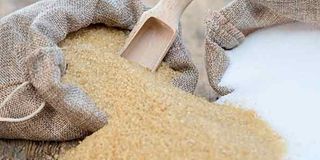Bad weather, breakdowns hinder Big Four’s sugar production

Dares Salaam. Sugar production by Mtibwa Sugar Estates, Kagera Sugar Limitedd, Kilombero Sugar and TPC Ltd dwindled by 7.2 per cent in 2017/18 compared with the previous year, thanks to climatic changes and factory break down problems.
Going by data compiled by the Sugar Board of Tanzania (SBT) and the Association of Sugar Manufactures, production of the commodity dropped to 303,000 tonnes in 2017/18 compared with 326,594.35 tonnes registered the year before.
In addition to the Big Four producers, Manyara Sugar Limited, a new entrant, produced 4,249.13 tonnes in the 2016/17 season, bringing the total production to 330,843.48 tonnes. The countrywide actual demand stands at around 450,000 tonnes.
Association of Sugar Manufacturers’ managing director Deo Lyato said drought that covered the entire East Africa and Southern African Development Community (SADC), was to blame for the negative production trend.
“The changing climate was the “fundamental cause” of lower production, with drought affecting the quality of sugar cane,” noted Mr Lyato.
His sentiments were echoed by TPC Sales and Marketing executive officer Allen Maro on the grounds that high temperatures during the period lowered the level of sugar in sugarcane.
This means that they had to use more sugarcane to produce the same amount of sugar. TPC’s production last season stood at 96,719 tonnes, well below the previous year’s 111,942 tonnes. He also put blame on machinery break down at the factory, saying the problem left some cane unprocessed.
“Unfortunately, 160,000 tonnes were left uncrushed before the rainy season. This contributed to the drop in sugar production,” noted Mr Maro.
Solution to Climate Change
Kilombero Sugar Company commercial director Fimbo Butallah sees a need for undertaking a climate study to carry out any necessary remedial measures.
“The seasons are changing and we have to be able to adapt,” Mr Butallah was quoted as saying, adding that his company was conducting a feasibility study for expansion.
“We want to expand production. In the end, we will start to invest heavily on irrigation schemes and buying sugarcane from other farms instead of only relying on our plantation.
Kagera Sugar plans to increase production to 84,000 tonnes in 2018/19 from 75,000 tonnes last season. To hit the target, Kagera Sugar director Abel Magesa says they would embrace best practices, including increasing areas under irrigation, and expanding farms to 14,500 hectares from the current 14,000 hectares.
“With expansion and improvement of the farms, we have all it takes to boost production,” he explained.
Call on investors
Tabling budgetary estimates for the ministry of Industry, Trade and Investment in Parliament on May 5, this year, Mr Charles Mwijage, who heads the docket called for more investors to come and invest in the sector.
“Recognising the country’s increased sugar demand, the government is encouraging investment in new projects and expansion of the current investment in order to sustain the country and sell the surplus outside Tanzania,” noted Mr Mwijage.
New projects:
Mkulazi sugar factory
Upon its completion, the project, which is currently being carried out at Morogoro’s Mkulazi and Mbigiri prison areas in effort to support President John Magufuli’s industrialisation drive, has a capacity to churn out 200, 000 tonnes annually.
The project, which is carried out by the National Social Security Fund (NSSF) in collaboration with PPF Pension Fund, is set to open 100,000 employment opportunities at the beginning, with the number as well as production, set to increase as time goes on.
Ruipa
The 100,000-tonnes-of-sugar-per-year factory is located along the Ruipa River in Kilombero Valley, Morogoro Region.
So far, there is no financing commitment for the project that is to be built in a joint venture with SBT.
Bakhresa Sugar factory
Bakhresa Group corporate affairs director, Mr Hussein Sufian was in January this year quoted by The Citizen On Saturday as saying the Bagamoyo-based factory was expected to be producing 30,000 tonnes annually.
He stated that the Sh669 billion project was scheduled to be completed in five to ten years. The project will be undertaken in three phases, he said.
The First Phase involves planting seedlings, establishing sugarcane plantations and establishing sugar mills. The Sh167.3 billion First Phase, which kicked off in 2017/18, is scheduled for completion in 2020, according to Mr Sufian.
The Second Phase will involve expansion of sugarcane plantations, starting with 2,000 hectares.
How the Third Phase will be undertaken will depend on phases one and two. Last October, President Magufuli offered Mr Said Bakhresa, the group founder, 10,000 hectares to set up the factory.
Benefits of the new projects
The industry anticipates to be a significant contributor to government revenues through corporate tax on profits, Pay As You Earn( Paye) deductions from earnings by employees, Value Added Tax (Vat) on goods and services as well as other applicable duties and levies.
The sugar industry will contribute to employment creation, which is the catalyst for development of infrastructure networks such as roads, electric power, water supply projects, education and health services in the surrounding rural communities.
Smuggling
But manufacturers have warned that the influx of smuggled sugar into the country is likely to threaten investors and eventually the future plan of closing the deficit gap of nearly 150,000 tonnes come 2025.
The taxman was once quoted by local media as saying from July 2013 to December 2015, the authority seized 1,158 bags of sugar weighting 50 kilograms each.
Last year some 13 tonnes of sugar were seized in Kagera Region by authorities as smugglers sought to illegally cross the border to Kenya with the consignment.
The product from the Kagera Sugar factory was switched and packed into bags from South Nyanza Sugar Company Limited (Sony Sugar) of Kenya to try and dupe officials into thinking that the product originated from the neighbouring country.
Kagera Sugar’s Magesa says if the trend (smuggling) continues in a long-run, many factories will likely halt their expansion.
He said local producers were losing business to smugglers as the latter were running away from paying tax, making the market uncompetitive.
“It is hard for our products to compete with smuggled sugar, which is sold at a throw-away price since it entered the market without facing the relevant taxes,” Mr Magesa told The Citizen On Saturday over phone.
“This is likely to scare away new investors. The existing operators will also likely either scale down production or stop operations,” he said.
With hopes that the current government is doing all in its power to fight against smuggling, Mr Magesa says Kagera Sugar is set to increase its production to 84,000 tonnes during the current season, well above the previous season’s 75,000 tonnes.
And in their totality the four companies are set to increase production to 348,000 tonnes and 424,000 tonnes in the current and next production seasons respectively.
Last month Tanzania Sugar Producers Association director Seif Seif said due to presence of smuggled sugar in the market the four companies were unable to sell 80,000 tonnes of sugar imported for domestic consumption between March and June, this year.
The amount accounts for 61.5 per cent of the 130,000 tonnes imported legally by the said companies to fill the gap as local production during the period stopped, to pave the way for sugarcane harvesting. Some unscrupulous traders were packaging industrial sugar and selling it as domestic sugar.
The companies’ alleged that some of the smugglers were selling illegally imported sugar as a local brand.
“We have conducted our own survey and found sugar in sacks bearing logos of Tanzanian companies, indicating that the product was brought into the country and repackaged in bags of local brands to conceal it from the authorities,” said Mr Seif. Stakeholders say for local manufacturers to compete with the smugglers, it means the government has to come in and remove some of the taxes. Players in the sector warn that the issue of smuggling has a negative impact on the country’s economy, saying it is denying the government a lot of revenue.
“The smugglers do not create jobs or not pay taxes; all they do is make huge profits for themselves. As a result, companies’ taxes to TRA are likely to go down because of the adverse impact on sales,” he noted.
This, prompted manufacturers to call for the government to intensify its crackdown on sugar smugglers.
Tanzania Revenue Authority (TRA) director for Tax Payer Services and Education Richard Kayombo said the taxman had formed a flexible anti-smuggling team to patrol the borders.
He said in collaboration with the Police Force, the special team is currently working around the clock to deal with dishonest traders.
He stated that drastic measures, including confiscating their consignments, will be taken against them.
However, he said, geographical location was a challenge in addressing what manufacturers termed as ‘economic sabotage’ as the brands by Tanzanian companies were being utilised illegally for the benefit of a few unscrupulous traders.
“Tanzania is too huge to control. It is bordered by eight countries. It is surrounded by the Indian Ocean shore and three lakes namely; Victoria, Tanganyika and Nyasa,” said Mr Kayombo.
To address this and attract more investors in the industry, Mr Kayombo called on the public to cooperate with the relevant authorities by reporting dishonest traders who deal in the commodity.




